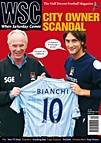 It’s not about money, of course. But occasionally players wonder if their clubs are as eager to win trophies as they are – and if not, whether they should consider a move. Harry Pearson sympathises
It’s not about money, of course. But occasionally players wonder if their clubs are as eager to win trophies as they are – and if not, whether they should consider a move. Harry Pearson sympathises
The arrival of the British summer used to be heralded by the swooping of a swallow. These days, though, the most reliable signal that it is time once again to stand around a barbecue with rain dripping from your nose is a chorus of football’s top names wondering aloud in the press if “this club’s ambition matches my own”.